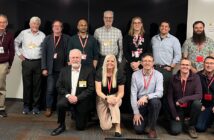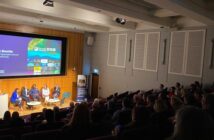The Open University (OU) has recently signed a major deal enabling Bradford Space (a Netherlands-based satellite propulsion system manufacturer) to make and utilise OU patented valves for their propulsion systems.
Whilst the OU is widely recognised as a leading distance learning provider, the university also carries out a broad range of research and has a high level of industry engagement through its Knowledge Exchange activities.
The deal, which will run until October 2029, means Bradford Space are able to produce this piece of OU technology, which is a more robust, efficient and cheaper solution to the current valves being used. Use of the valves demonstrates real world application of the University’s research and the impact this can have.
Bradford Space form a key part of a satellite supply chain by providing propulsion systems to satellite makers, who then sell these to businesses and organisations, for use by their customers. One such organisation is currently working to democratise internet access through the use of satellites, enabling those in disadvantaged areas who do not have internet access (such as those in areas of the global south) to access the web from mobile devices. This large-scale reach and impact aligns with the OU’s mission to be open to people, places and ideas, and promoting principles of environmental sustainability and social justice.
The new valve will be used to release the propellant to an electric thruster that small satellites use to alter their position in space so that they can be utilised effectively. The systems are also used to actively de-orbit the satellites at their end of life. The mechanically robust valve has an extremely low leak rate compared to current models being used in Low Earth Orbit satellites (LEO’s) and has been called a ‘game changer’ due to its ability to control gas flow as well as turn gas flow on and off.
96% of all spacecraft launched are satellites. And the life span of LEO’s is dictated by the amount of propellant the satellite carries, as once this gas runs out, the satellite will be decommissioned. The OU valve minimises leaks and increase efficiency, which can increase life span and reduce the need to produce and send up new satellites.
The University has been in talks with Bradford Space since October 2022, and following rigorous capability testing, produced a small, lightweight valve and manufacturing system blueprints which were approved in November 2023. Bradford Space intends to send test flight satellites with the technology on board in May 2024.
Use of the valve will be monitored to evidence the reach and impact on businesses and individuals who benefit from OU research outcomes. The University’s mantra that ‘The Future is Open’ demonstrates its commitment to open usage of technology, research and collaborating for societal benefit.
The valve was invented by Dr Simon Sheridan, Dr Geraint Morgan and Martin Jarvis at the OU. Simon and Geraint are Directors of Applied Science and Technology Solutions Ltd (AS&TS), which has manufacturing rights allowing valves to be built for testing. The University’s research function supported the invention, creation and delivery of the valve and its manufacturing process, collaborating for knowledge exchange and sharing mutually beneficial outcomes with AS&TS.
Bradford Space said of the deal,
“After learning of the OU valve, we spent a good deal of time assessing its suitability for our propulsion systems. Working closely with the OU and AS&TS team, we methodically stepped through the iterative process of configuring the valve to meet desired performance requirements. The OU demonstrated a keen understanding of our business goals and worked collaboratively to jointly devise an engineering solution to meet our system needs.”
Kevin Shakesheff, Pro Vice Chancellor for Research and Innovation added,
“This deal demonstrates the OU’s ability to understand industry problems and to apply our knowledge, research and expertise to find and deliver practical and forward-thinking solutions. At the OU, our research, mission, and ethos enable us to work collaboratively with different industries, sectors, organisations, charities, and companies to solve societal challenges. This deal is a significant milestone for the University and demonstrates the real-world impact of our research. We hope to further develop our partnership with Bradford Space to realise more solutions.”
The valve is also currently being used by the University in some of its OpenSTEM Labs experiments, where students can remotely engage in experiments by operating equipment from home. There is also potential applications in the hydrogen vehicle sector which the University is investigating.



